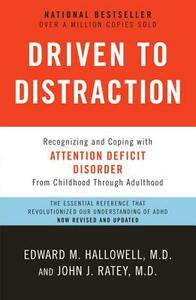Take a photo of a barcode or cover
314 reviews for:
Driven to Distraction: Recognizing and Coping with Attention Deficit Disorder
John J. Ratey, Edward M. Hallowell
314 reviews for:
Driven to Distraction: Recognizing and Coping with Attention Deficit Disorder
John J. Ratey, Edward M. Hallowell
informative
fast-paced
*2 stars*
TLDR:
Driven to distraction has a lot information, useful tips, and is somewhat relatable. The science about adhd is quite dated though (as is the cis-heteronormativity). While it had many useful insights, it focussed primarily on hyperactive men and the problems they face, and only touched briefly upon adhd in women, or less impulisve and less stereotypical manifestations of the disorder. Still worth reading since it is very informative and well written, but if you don't recognize yourself in it, that's probably why.
REVIEW:
When I started looking for books on adhd after being newly diagnosed, this book was the first on a lot of lists; described by many as 'the adhd-bible'. So naturally I decided to pick it up. I found a lot of interesting information in this book, and a lot of useful tips, especially in chapter 8. I do have some notes, however, which I will address later on.
What Driven to Distraction does well is explain what adhd is on a fundamental level, how it is more than simply distractibility, impulsivity, hyperactivity, and what problems people commonly face as a result of untreated adhd. (When it comes to how adhd presents and how people cope, however, the author primarily focusses on hyperactive men.. which I'll discuss more later.)
For example, while I knew people with adhd experience hyperfocus, I never realized you can also hyperfocus on negative thoughts/emotions, often leading to anxiety like symptoms and excessive worrying. (Or hyperfocus on harmful habits, increasing the risk of addiction)
The author also explains how living with undiagnosed adhd can cause low self-esteem, depression, and anxiety, because many people with adhd are treated like failures by society.
I would, however, have like to read more about emotional dysregulation, which is very common in people with adhd, and often happens at a biological level rather than a psychological one.
Most of the chapters are structured around case studies of particular clients the author has seen. While those were well written and intriguing, they were very one-sided: they usually focussed on the hyperactive, disruptive, impulsive high-stimulation seeking boy or man. This is of course a common manifestation of adhd and deserves it's place in the book; it is, however, by far not the only one. The author does stress this continually, stating how adhd often looks different in women, doesn't require hyperactivity, can be masked by anxiety or compulsive behaviours; however, he barely illustrates this, only using a case study or two, and hardly elaborating on these less stereotypical manifestations of the disorder. This is especially true in the chapters on relationships, family and children. (The chapter on types of adhd goes into some detail about this, but only briefly, and that's about it.)
I get of course that this book was published in the 90's, and that it was incredibly revolutionary at the time; it showed people that disruptive, impulsive, inattentive behaviour is not necessarily due to a character flaw or lack of discipline, but due to a neurological condition that can be treated quite effectively.
And while I did find a great deal of recognition and some new information in this book (although the chapter on science is quite dated; for information about the biology of adhd this book is not great) , I didn't find it to be quite the "adhd bible" people described it as. I get that for some with the more (stereo)typical form of adhd this book can be a life-changer.
I do think it's a good book to have read if you're interested in learning about adhd, it has definitely broadened my understanding of it; it should just not be the only book. (I wonder if delivered from distraction, a more recent book by the same authors, might be better.)
One last thing that bothered me was the author's continual uses of 'he or she', and the heteronormativity in the chapters on relationships and family. (I don't think it has ever occurred to the author that queer relationships exist).
Then again, this book was written in the 90's, but I'm sure there are more inclusive and more current books out there.
If I find alternatives I will list them here.
TLDR:
Driven to distraction has a lot information, useful tips, and is somewhat relatable. The science about adhd is quite dated though (as is the cis-heteronormativity). While it had many useful insights, it focussed primarily on hyperactive men and the problems they face, and only touched briefly upon adhd in women, or less impulisve and less stereotypical manifestations of the disorder. Still worth reading since it is very informative and well written, but if you don't recognize yourself in it, that's probably why.
REVIEW:
When I started looking for books on adhd after being newly diagnosed, this book was the first on a lot of lists; described by many as 'the adhd-bible'. So naturally I decided to pick it up. I found a lot of interesting information in this book, and a lot of useful tips, especially in chapter 8. I do have some notes, however, which I will address later on.
What Driven to Distraction does well is explain what adhd is on a fundamental level, how it is more than simply distractibility, impulsivity, hyperactivity, and what problems people commonly face as a result of untreated adhd. (When it comes to how adhd presents and how people cope, however, the author primarily focusses on hyperactive men.. which I'll discuss more later.)
For example, while I knew people with adhd experience hyperfocus, I never realized you can also hyperfocus on negative thoughts/emotions, often leading to anxiety like symptoms and excessive worrying. (Or hyperfocus on harmful habits, increasing the risk of addiction)
The author also explains how living with undiagnosed adhd can cause low self-esteem, depression, and anxiety, because many people with adhd are treated like failures by society.
I would, however, have like to read more about emotional dysregulation, which is very common in people with adhd, and often happens at a biological level rather than a psychological one.
Most of the chapters are structured around case studies of particular clients the author has seen. While those were well written and intriguing, they were very one-sided: they usually focussed on the hyperactive, disruptive, impulsive high-stimulation seeking boy or man. This is of course a common manifestation of adhd and deserves it's place in the book; it is, however, by far not the only one. The author does stress this continually, stating how adhd often looks different in women, doesn't require hyperactivity, can be masked by anxiety or compulsive behaviours; however, he barely illustrates this, only using a case study or two, and hardly elaborating on these less stereotypical manifestations of the disorder. This is especially true in the chapters on relationships, family and children. (The chapter on types of adhd goes into some detail about this, but only briefly, and that's about it.)
I get of course that this book was published in the 90's, and that it was incredibly revolutionary at the time; it showed people that disruptive, impulsive, inattentive behaviour is not necessarily due to a character flaw or lack of discipline, but due to a neurological condition that can be treated quite effectively.
And while I did find a great deal of recognition and some new information in this book (although the chapter on science is quite dated; for information about the biology of adhd this book is not great) , I didn't find it to be quite the "adhd bible" people described it as. I get that for some with the more (stereo)typical form of adhd this book can be a life-changer.
I do think it's a good book to have read if you're interested in learning about adhd, it has definitely broadened my understanding of it; it should just not be the only book. (I wonder if delivered from distraction, a more recent book by the same authors, might be better.)
One last thing that bothered me was the author's continual uses of 'he or she', and the heteronormativity in the chapters on relationships and family. (I don't think it has ever occurred to the author that queer relationships exist).
Then again, this book was written in the 90's, but I'm sure there are more inclusive and more current books out there.
If I find alternatives I will list them here.
I flew through this book like it was a page-turner - so interesting and easy to read. And I wish everyone WOULD read it! There's so much we can learn just from understanding what ADD is, not to mention how much hardship could be reduced if more kids, families, teachers, SLPs, therapists, etc. had the language to talk about how brains work and how to meet more brains where they are.
• • •
"I think people come to words much as lovers get together. They stumble onto each other, at the oddest of times, in the strangest of places. They will meet in an empty laundromat on a rainy Sunday afternoon, or they will catch each other's eyes across a ballroom dance floor in the middle of a wedding waltz. They will meet without appointment and strike up a relationship without an agenda. There may be a long courtship or a whirlwind romance. There may be protracted avoidance, even what looks like a phobia . . . or there may be an instant avidity, what amounts to love at first sight. Some carry on a kind of epistolary relationship with words, expressing their feelings through the formal prose of elegant notes, while others jump at words and bark them out at the world in the immediate poetry of certain street-corner vendors. Some slap their words up on posters on telephone poles, while others keep them in reserve, like a pistol concealed in a pocketbook. Some read haltingly, like the nervous lover, hat in hand, while others seem born to orate. We all woo language differently, and language grants us her favors in different ways. Sometimes the relationship takes off, although it is rare there is a ride without bumps. While utterly beautiful, endlessly varied, and thoroughly transfixing, language can also be frustrating, confusing, exasperating, and unforgiving."
"American society tends to create ADD-like symptoms in us all. We live in an ADD-ogenic culture. What are some of the hallmarks of American culture that are also typical of ADD? The fast pace. The sound bite. The bottom line. Short takes, quick cuts. The TV remote-control clicker. High stimulation. Restlessness. Violence. Anxiety. Ingenuity. Creativity. Speed. Present-centered, no future, no past. Disorganization. Mavericks. A mistrust of authority. Video. Going for the gusto. Making it on the run. The fast track. Whatever works. Hollywood. The stock exchange. Fads. High stim. It is important to keep this in mind or you may start thinking that everybody you know has ADD. The disorder is culturally syntonic - that is to say, it fits right in."
• • •
"I think people come to words much as lovers get together. They stumble onto each other, at the oddest of times, in the strangest of places. They will meet in an empty laundromat on a rainy Sunday afternoon, or they will catch each other's eyes across a ballroom dance floor in the middle of a wedding waltz. They will meet without appointment and strike up a relationship without an agenda. There may be a long courtship or a whirlwind romance. There may be protracted avoidance, even what looks like a phobia . . . or there may be an instant avidity, what amounts to love at first sight. Some carry on a kind of epistolary relationship with words, expressing their feelings through the formal prose of elegant notes, while others jump at words and bark them out at the world in the immediate poetry of certain street-corner vendors. Some slap their words up on posters on telephone poles, while others keep them in reserve, like a pistol concealed in a pocketbook. Some read haltingly, like the nervous lover, hat in hand, while others seem born to orate. We all woo language differently, and language grants us her favors in different ways. Sometimes the relationship takes off, although it is rare there is a ride without bumps. While utterly beautiful, endlessly varied, and thoroughly transfixing, language can also be frustrating, confusing, exasperating, and unforgiving."
"American society tends to create ADD-like symptoms in us all. We live in an ADD-ogenic culture. What are some of the hallmarks of American culture that are also typical of ADD? The fast pace. The sound bite. The bottom line. Short takes, quick cuts. The TV remote-control clicker. High stimulation. Restlessness. Violence. Anxiety. Ingenuity. Creativity. Speed. Present-centered, no future, no past. Disorganization. Mavericks. A mistrust of authority. Video. Going for the gusto. Making it on the run. The fast track. Whatever works. Hollywood. The stock exchange. Fads. High stim. It is important to keep this in mind or you may start thinking that everybody you know has ADD. The disorder is culturally syntonic - that is to say, it fits right in."
If you are starting to learn about ADD/ADHD (say, if you or someone close to you was recently diagnosed) this is an *excellent* starting point. It does a ton to dispel the 90s mentality of what many folks think of ADHD (a hyperactive little boy who shouts and runs and makes a scene) and paints a more realistic picture of what it can look like in different people, how it manifests in men vs. women, adults vs. children. This is a great resource.
This book really helped me understand myself better, and has started my journey towards moving through life in a more confident and successful way.
As the wife and mother of two ADD superstars, this book was both instructive and informative. The case studies helped me to understand the perspective of "my boys," and explained the reasons certain systems and structures work in our house, while others don't. The concrete tips at the end of the book weren't necessarily new given the amount of research we've done, but they were definitely on-point. I sincerely appreciated the suggestions for parenting a child wIth ADD, because it truly does run counter to anything else you will ever read. We've been "negotiating" with our child since Kindergarten and have received plenty of flak for it ... it felt nice to be validated by the pros!
informative
reflective
fast-paced
felt personally attacked multiple times throughout the book. despite being diagnosed almost a year ago, it was only by reading this book that i can now admit to myself that i have adhd. i wish it had gone more into the biology of adhd, but i’m sure our understanding has changed significantly in the past 15 years, and it covered the non-biological aspects of the syndrome so comprehensively that there was really no need for more biological info
I loved the real world examples. It went in to great detail about the different ways ADD can present in different people, which was exactly what I was looking for. It just went on too long. And it was a bit dated.
Also, the mouth noises!! OMG! 🤢
Also, the mouth noises!! OMG! 🤢
emotional
hopeful
informative
inspiring
reflective
medium-paced
Incredibly informative and enlightenig for someone with a recent ADHD diagnosis. Patient stories help underline the content and there were several points where I felt a deep and sometimes emotional connection with a patients story.
Great book to refresh my knowledge on ADD, especially as my ADD kid moves into adulthood. I wish there was more on strategy for dealing with ADD but I was reminded that every person’s ADD is unique to them and publishing specific step-by-step strategies is reductive. This is a must read for educating yourself on ADD.
challenging
informative
slow-paced





